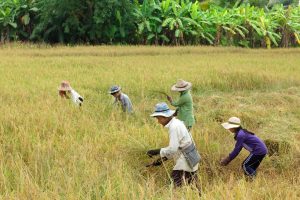Yesterday, a Thai export body questioned a proposal by Thailand and Vietnam to form a rice export cartel that would pool their combined market share in order to support farmers and manage rising production costs.
The proposed export pact was announced by a Thai government spokesperson after agriculture officials from the two nations met on the sidelines of a farms expo in Bangkok.
Spokesperson Thanakorn Wangboonkongchana said in a statement that the price of the staple “has been low for more than 20 years while the cost of production has been increasing,” Reuters reported. The aim of the partnership was “to raise rice prices, increase farmer income, and increase bargaining power in the global market,” Thanakorn added.
Thailand and Vietnam are the world’s second and third biggest rice exporters after India, representing around 26 percent of global exports, and any coordinated move to form a price cartel could have significant flow-on effects on the global rice market, especially given the rising global prices for basic commodities prompted by the war in Ukraine. The announcement came amid a glut in the global rice market with rice prices in India falling to a five-year low due to the depreciating rupee and ample supplies in the world’s top rice exporting nations.
But Chookiat Ophaswongse, the honorary president of Thailand’s Rice Exporters Association, told Reuters that the idea was poorly conceived. Given that they lack market predominance, if Thailand and Vietnam raised prices in a coordinated way, he said, price-sensitive buyers would simply flock to alternative suppliers, such as India, which is responsible for around 40 percent of global rice exports. “Politicians don’t understand the rice market and did not discuss this with the association,” Chookiat said.
In a similar vein, Nguyen Ngoc Nam of Vietnam’s food association also poured cold water on the plan, telling Reuters that the aim of the talks with Thailand was not price control but food security. “It’s not reasonable to talk about raising or controlling rice prices at this time when the global food price is on the rise,” Nam said.
These mixed messages suggest a degree of uncertainty as to how serious the Thai-Vietnamese plan is, and whether it will come to anything. But such a cartel, should it eventuate, would reflect the increasing tendency of governments to intervene in the workings of the market in order to achieve national objectives, such as to control prices or to maintain domestic political stability.
In Southeast Asia, the most recent example of this resurgent protectionism has been provided by the government of Indonesia, which imposed export restrictions on both coal and palm oil – in the latter case, amounting to a blanket ban – in order to control the domestic prices of electricity and cooking oil. Malaysia has also halted chicken exports, due to domestic shortages and rising prices, leading to likely shortages in import-dependent Singapore.
As global prices continue to rise against the backdrop of the turmoil in eastern Europe, we can no doubt expect to see further similar government interventions in the months to come.

































